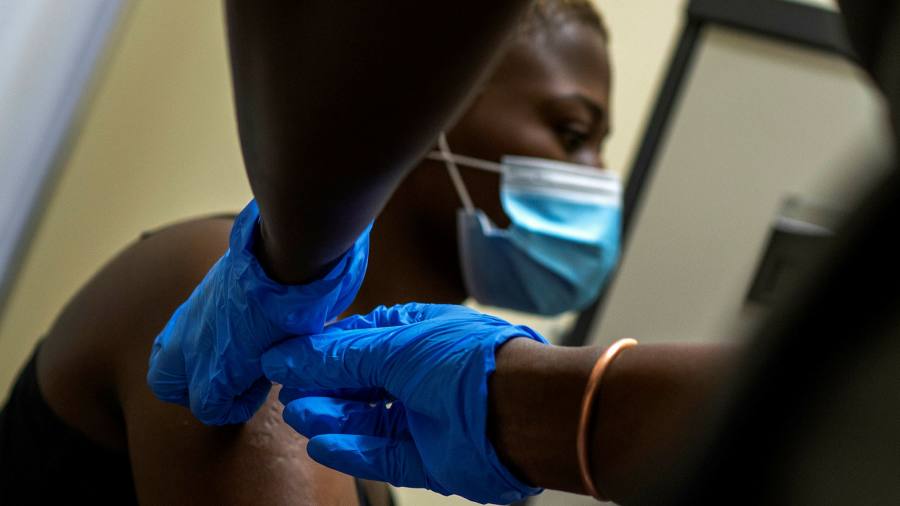[ad_1]
South Africa has moved to halt its rollout of the Oxford/AstraZeneca vaccine after preliminary and limited evidence showed it failed to protect against mild and moderate forms of disease caused by a coronavirus variant first detected in the country.
Distribution of the AstraZeneca jab, scheduled to begin in the country this month, would be put on hold to study its effects including on severe cases in more detail “until the scientists give us clear indications as to what we need to doâ€, Zweli Mkhize, South Africa’s health minister, said on Sunday.
A small trial led by Oxford university and South Africa’s Wits university found that the AstraZeneca vaccine had low efficacy against milder illness with the 501Y.V2 variant, according to findings first reported by the Financial Times on Saturday. The paper, which has not yet been peer reviewed, did not study the jab’s effects on stopping severe illness.
The South African government had been planning to begin jabs for frontline health workers this month using 1.5m doses of the AstraZeneca vaccine that are being supplied by India’s Serum Institute. It will now accelerate rollout of other vaccines it has ordered.
“We can still proceed with this rollout, but we need to do it wisely with a stepped approach,†said Salim Abdool Karim, the chairman of South Africa’s ministerial advisory committee on Covid-19.
Drugmakers and scientists have been racing to understand how far the 501Y.V2 variant may reduce the effectiveness of some vaccines as it has become dominant in South Africa and with similar strains now being detected elsewhere in the world.
Recent results for vaccines produced by Novavax and Johnson and Johnson have shown less effectiveness against the 501Y.V2 variant than against other forms, but showed complete protection against severe Covid-19 regardless of the variant.
South Africa is planning to speed up its rollout of the J&J single-shot vaccine to health workers after results that it offers strong protection against severe Covid-19 with the 501Y.V2 variant, said Glenda Gray, leader of J&J’s local trial.
The country has so far secured 9m J&J doses and 20m doses of Pfizer’s vaccine. “What will be available to the health workers will be those vaccines†in the coming weeks, Mkhize said.
J&J’s vaccine uses a similar design to AstraZeneca’s, which raises hopes that the latter is also effective against severe Covid-19, said Shabir Madhi, the leader of the South African study.
AstraZeneca said on Saturday that the South African study was limited by the fact that subjects were predominantly young, healthy adults, and that numbers were small. There were no deaths or hospitalisations in the study, which involved more than 2,000 people with a median age of 31.
The drugmaker said it believed its vaccine could still protect against severe disease caused by the 501Y.V2 variant, which has a key mutation, E484K, that appears to neutralise antibodies. The mutation has also been detected in variants in Brazil and, in limited numbers, in the UK.
AstraZeneca also said it believed other immune responses, such as T-cells, could offer protection against the worst of the disease when caused by this variant. The South African study was not designed to measure this response, and there was no data available. However, initial data indicated those responses remained intact against the South African variant, AstraZeneca said.
Both Oxford and AstraZeneca said they had begun tweaking their vaccine with a view to making it available in autumn, if necessary. Late on Sunday, they had not responded to a request for comment on South Africa’s decision.
The World Health Organization told the Financial Times it was important to determine effectiveness in preventing moderate and severe cases, given the South African trial’s small sample size and the low risk of severe disease to the participants.
“What these results tell us is that we need to do everything we can to reduce circulation of the virus and delay mutations that may reduce the efficacy of existing vaccines,†the WHO said. “It also seems increasingly clear that manufacturers will have to adjust to the Covid-19 viral evolution, taking into account the latest variants for future booster shots.â€
[ad_2]
Source link





